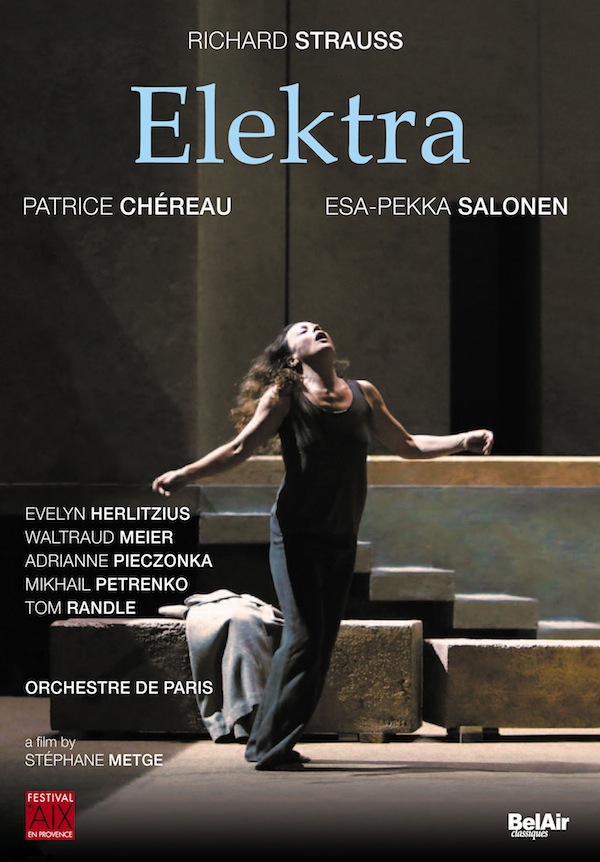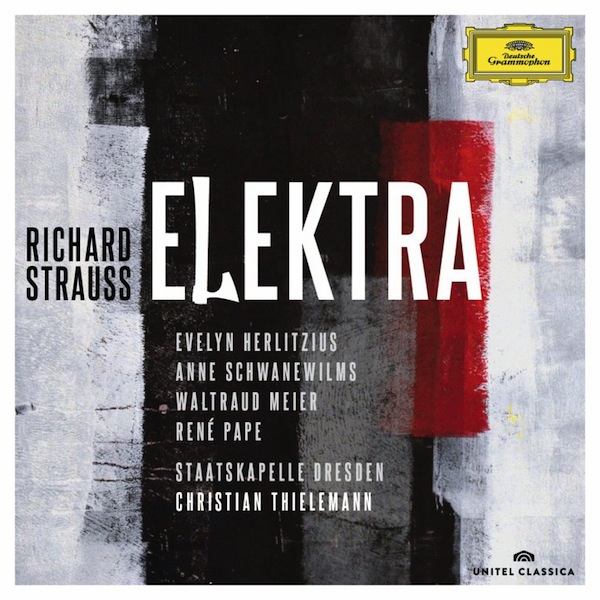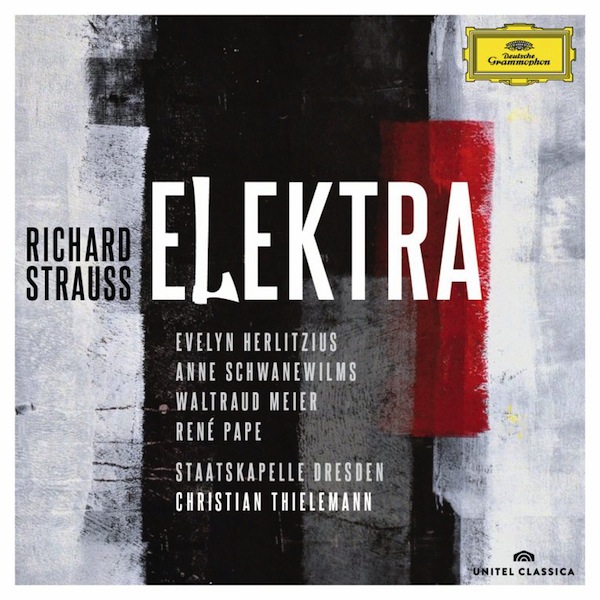
A quintessential Elektra on Richard Strauss’ 150th birthday
By Sebastian Spreng, Visual Artist and Classical Music Writer
Two remarkable new recordings of Elektra, the most intense and condensed Richard Strauss opera honor the Bavarian composer’s 150th birthday with appropriate forcefulness. Probably his greatest opera, at times a blind alley for performers and audiences alike, Elektra comes to us in two versions featuring the same leading soprano (plus same illustrious mezzosoprano), something that inevitably prompts comparisons with illustrious predecessors. Separated by only six months, the first was recorded on DVD at the Aix-en-Provence Festival in August 2013, and the second on CD at the Berliner Philarmonie concert hall in January 2014, played by Dresden’s venerable Staatskapelle, the Straussian orchestra par excellence and the pride of the Saxon city in which the composer premiered the majority of his operas.
The Staatskapelle’s chief conductor, Christian Thielemann, took his musicians to Berlin for this concert version, which measures up to the one the legendary Karl Böhm taped in 1960 with the same orchestra in the opera’s first stereophonic recording (also for DG). There is a chamber-like clarity, balance and transparency to Thielemann’s conducting, worthy of the highest praise (echoing Strauss’ almost impossible request to play it à la Mendelssohn). Thielemann delivers a symphonic poem with voices lacking at certain moments a touch of extra drama.
From that luxurious wrapping, the three main characters emerge with distinctive personalities. Anne Schwanewilms’ Chrysothemis displays a lyricism that recalls Lisa della Casa at Salzburg in 1957, Mitropoulos conducting, and its purity heightens the contrast with her sister and her mother. Schwanewilms plays the hopeful younger sister without the visceral connotations of the legendary Rysanek. René Pape is a vocally impeccable – somewhat distant – Orest, lacking the dramatic urgency of a Fischer-Dieskau or a Hotter. He is supported by Frank van Aken as an effective Aegisth, for once a young man rather than the usual caricature. Waltraud Meier plays a worthy mother to Pape’s Orest, silky, fearsome, steely, of compelling determination and vocalism. Though showing some decline in this her second recorded version on CD (the first was with Barenboim in 1994), she still shines with infallible musicality. Meier’s grande-dame sly coldness is a perfect counterpart to the blood-curling Evelyn Herlitzius, who is, along the American Christine Goerke, the supreme Elektra of this young 21st century. In her feistiness and intensity she brings to mind the great Inge Borkh, who was Böhm’s (and Mitropoulos’) Elektra, another reason to seek out parallels between two versions by the same orchestra, separated by half a century.
Herlitzius and Meier are singers who should and deserve to be seen, and the DVD of the Aix production conducted by Patrice Chéreau is a clear winner. All vocal excesses – such as the occasional vibrato and shrillness of the soprano – are forgiven in view of the intensity of the mother-daughter eye-to-eye confrontation. And the final liberation of a child-woman consumed by waiting is thoroughly moving. Symbol of an oppressed pack, Herlitzius’ Elektra also inspires compassion and tenderness, as she is a victim of everyone and, especially, of herself. And Chéreau masterfully manages to evoke sympathy toward all three women. The German soprano covers an extremely wide, even total, spectrum, and one could well ask if her total dedication won’t, sooner or later, have an adverse effect on her vocal health. From her interaction with each of the other characters to the last detail of her body language, she is undoubtedly Elektra.
For her part, Waltraud Meier delivers a Klytämnestra very different from the one she sang under Lehnhoff in Salzburg. The German mezzo is part of a modern generation of Klytämnestras. She is not the monster played by legends like Mödl, Höngen, Varnay, Madeira and Resnik, but a pathetic, bitter, betrayed woman, displaying a hopeless sadness akin to that of the reserved, modest, elegant, justifiably manipulating Jocasta. Splendid is the word for Adrianne Pieczonka’s Chrysothemis, a realistic creature reminiscent of Rysanek in her mix of sanity and incandescent carnality. Mikhail Petrenko’s Orest and Tom Randle’s Aegisth are both memorable. The rest of the cast is excellent, most prominently a team of great veterans associated with Chéreau who appear in cameo roles as a tacit goodbye to the maestro: Roberta Alexander, Renate Behle, Douglas McIntyre and Franz Mazura, now 90.
Beyond the outstanding performances and the precision the Paris Orchestra achieves under the always exceptional Esa-Pekka Salonen, the star of the show is the late Patrice Chéreau in what would be his artistic testament. With extreme simplicity and austerity, at every moment and in every department, the production bears the artistic stamp of the brilliant French director. The path trodden from his 1976 Ring trilogy in Bayreuth, by way of Janacek, Mozart, Stravinsky, Wozzeck, Lulu and Tristan, to this final Elektra evinces three decades of theatrical work of superlative refinement and eloquence. The walls, arches and staircases of this devastated Mycenae – transformed into a bunker by Chéreau’s faithful set designer Richard Peduzzi – recall the best of Adolphe Appia designs. Mauve, blue, gray and silvery-white chiaroscuros illustrate each scene with enviable pictorial rigor, and the same is true of the modern costumes that complete this theatrical accomplishment of a dynamism seldom seen on the operatic stage.
Thanks to Chéreau, the first scene with the servants is unusually interesting, as is that of the queen mother confessing her nightmares between lullabies and laments, the cries of a woman betrayed, forsaken in a place where the men went to war to never return. With or without Strauss’ music, Chéreau’s Elektra is the essential incarnation of Sophocles’ tragedy, but Strauss’ sound tsunami adds the perfect catalyst to each character. His approach leaves open ends and proposes unknown events as it draws a circle of amazing cleanliness.
Pure theater and pure music that give you goose bumps and reconcile as well as redeem a genre that is so often bastardized. With so much and so little, Chéreau and Salonen convey the infinite sadness of a doomed civilization and reaffirm this providential conjunction of Hoffmansthal and Strauss and of the powerful marriage of music and text, of opera and tragedy, of creators and performers. This is a potion under whose spell it is is difficult, if not impossible, to fall. A meeting and amalgam of periods and styles, of artists and audiences, all participating in a collective catharsis (the final applause proves it), this is one for the annals of musical theater.
An excellent CD and an essential DVD (containing a not-to-be-missed interview with Chéreau) that along with those of Friedrich/Böhm and Lehnhoff/Gatti is now part of a trio of unsurpassable-filmed Elektras.
* RICHARD STRAUSS, ELEKTRA, BEL AIR BAC 110 DVD
R.STRAUSS, ELEKTRA, THIELEMANN, 2CD, DG479 3387 R.STRAUSS, ELEKTRA, SALONEN, DVD BEL AIR BAC110


Recent Content
-
Artsarticle ·
-
Artsarticle ·
-
Artsarticle ·
